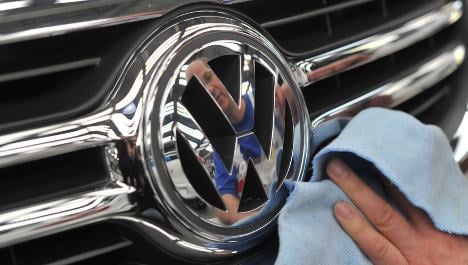VW’s second quarter net profit of €4.784 billion ($6.86 billion), up from €1.351 billion in the same period of 2010, dwarfed an average analyst forecast of around 2.5 percent compiled by Dow Jones Newswires.
It was accompanied by a first half net profit of €6.496 billion, up from €1.824 billion. But investors were clearly not impressed.
Shares in the auto giant plunged in midday trading on the Frankfurt stock exchange, losing 5.76 percent to €135.75 while the DAX index was down by 1.57 percent overall.
“Volkswagen’s results are very good,” NordLB auto analyst Franck Schwope told news agency AFP.
But the shares might have fallen, he said, because “some think the group is at a high point and cannot do any better.”
Schwope himself said he felt that VW, which wants to become the world’s biggest automaker by 2018, still had room to grow.
Meanwhile, second-quarter sales were 21.5 percent higher at almost €40.3 billion, and reached nearly 77.8 billion for the first half, VW said.
Chairman Martin Winterkorn said that “ongoing strong demand in strategically important markets is providing a tailwind” and that a large number of new models would help sustain results going forward.
VW currently owns nine brands of automobiles, ranging from luxury cars such as Audi, Bentley and Lamborghini to more affordable ones like Seat, Skoda and of course VW itself.
VW also owns controlling stakes in two truck makers, Scania and MAN, which it wants to merge into a heavy vehicle powerhouse.
But Winterkorn also cautioned that “the coming months will be challenging for us and will require us to work hard to maintain this high level.”
A statement said VW expected full-year 2011 deliveries to surpass the record 2010 level of 7.14 million, and that sales and operating profit would be “significantly higher than the previous year.” Those figures were €126.8 billion and 7.1 billion, respectively.
Second-quarter 2011 operating profit soared by 59.2 percent to €3.17 billion on a 14.6 percent rise in deliveries to 2.14 billion vehicles.
Winterkorn has already forecast that VW could sell eight million vehicles this year, thanks in large part to its strong position in major emerging markets.
The group put its net cash position on June 30 at €19.4 billion, a gain of 11.1 percent from the first half of 2010 despite investments in MAN, the Porsche Holding company and a stake in the auto-parts maker SG Carbon.
There are some clouds on the horizon however.
A plan to tie up with Suzuki to profit from its position in India has hit some bumps.
And there is still uncertainty over VW’s plans to merge with another Porsche company – the one that actually makes the iconic 911 sports cars.
AFP/mry



 Please whitelist us to continue reading.
Please whitelist us to continue reading.
Member comments